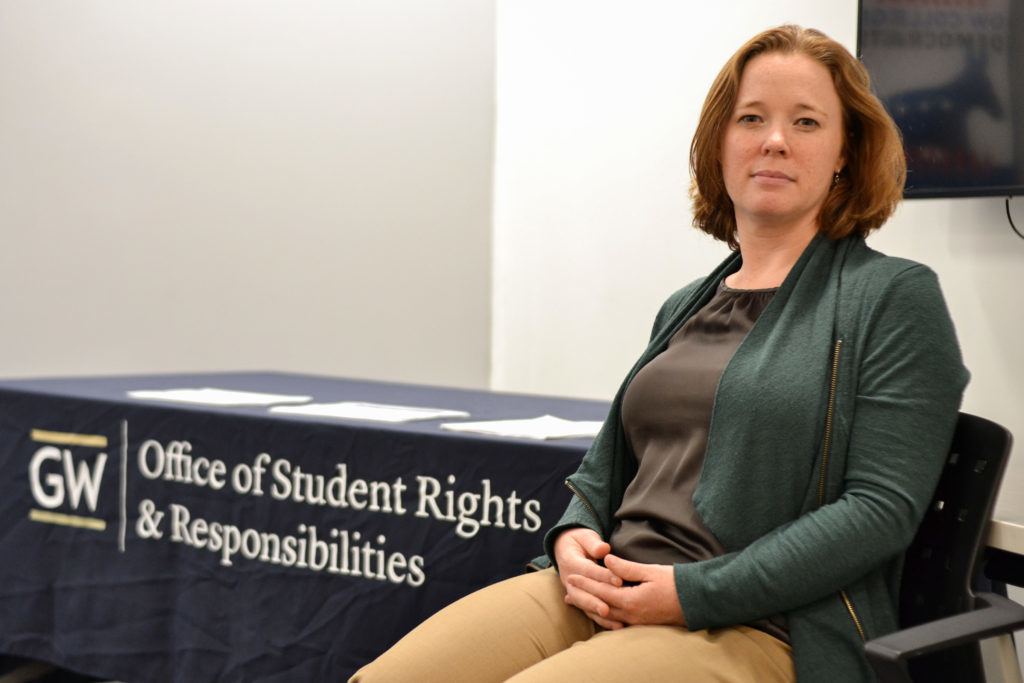Administrators have held five public listening sessions this month to garner student feedback about the code of conduct – but only seven students have attended.
After overhauling the code earlier this month – which included new avenues to appeal the outcome of a case and the removal of fines from sanctions – officials pledged to hold a series of listening sessions to hear students’ responses to the changes and any potential updates they would still like to see. Christy Anthony, the director of the Office of Student Rights and Responsibilities, said students might not turn out to the events because they may not feel that the code directly affects them.
“As the code is an expression of community values and, as we are all impacted by how GW responds to violations, everyone is affected,” she said in an email. “For that reason, our office will continue to host sessions and strive to expand outreach with a hope of increasing student participation.”
Four sessions have been held on the Foggy Bottom Campus, while one was hosted on the Mount Vernon Campus. No students attended three meetings, while two students attended the session on the Vern and five students attended the most recent gathering Wednesday.
Anthony said the meetings have included presentations from the office about changes to the code and opportunities for students to discuss what they “want to see” in the code of conduct.
“Any topics students would like to discuss can be part of these listening sessions,” she said in an email. “We’re taking a very broad approach to this review of the code and will consider all ideas that still allow us to uphold our legal obligations as an institution.”
In addition to the five public sessions, Anthony said her staff has led private sessions for different offices on campus and has also completed “deliberate outreach” to student groups that “hold an elected role to represent members of the student body” or that “might experience specific impact” once the code is implemented.
Anthony did not specify which offices and student groups the Office of Student Rights and Responsibilities has contacted or led private sessions for.
Anthony said her office will host five additional sessions in November. The next session will be hosted on Nov. 5 at noon in the Multicultural Student Services Center, she said.
She said her staff will “continue to evaluate timing, location and communication” and “partner with student groups and other established entities around campus” to improve student turnout during listening sessions.
“Hopefully by planning them further ahead, we’ll be able to get word out more, working more with resident life and student orgs, as well as some of the schools in the newsletters they send out,” she said in an interview Tuesday.
Anthony said that while her office is “charged with administering” the code, student feedback during listening sessions is important because they can often “shed new light” on changes students want to see in the code.
“We hope people have some really interesting and imaginative ideas about what would they like this to be because it’s an expression of community values at the end of the day,” she said.
Sammy Chuan, a junior who attended the listening session Wednesday, said he “by pure chance” walked in on the session in the MSSC and decided to stay. He said the listening sessions are beneficial because he has been on campus for three years – but Wednesday was the first time he had seen and read the code.
Chuan said he heard about previous listening sessions from a senior staff member in the MSSC but “brushed it off” because he was busy with midterm exams. He said the “only reason” he heard about the sessions was because the staff member mentioned it to him.
“If I wasn’t here on that day, I would not have known this was happening or that there was four other sessions happening,” Chuan said.
Chuan said low student turnout at previous sessions may be because of a “disconnect” between students and administrators, which can “push students away” from coming to events like listening sessions because many students aren’t familiar or comfortable with officials.
“There’s a stigma in general at GW that, ‘Oh, they won’t listen to me,’” he said. “The culture at GW would make these students not come to events.”





